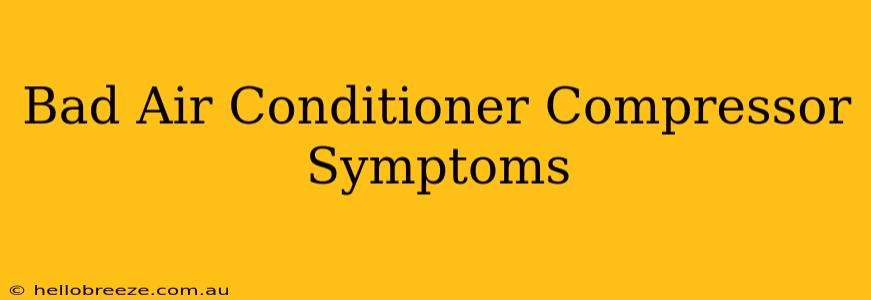Is your air conditioner struggling to keep up? A failing AC compressor could be the culprit. Ignoring the warning signs can lead to costly repairs, so it's crucial to understand the common symptoms of a bad AC compressor. This guide will help you identify potential problems and determine if it's time to call an HVAC technician.
Recognizing the Warning Signs of a Failing AC Compressor
A malfunctioning AC compressor doesn't always announce itself with a dramatic bang. Instead, it often displays a gradual decline in performance, manifesting in several subtle yet significant ways. Let's explore some key symptoms:
1. Weak or No Cool Air
The most obvious sign of a failing AC compressor is weak or insufficient cooling. If your AC is blowing warm or lukewarm air, even after running for an extended period, the compressor might be the issue. This is because the compressor is responsible for circulating the refrigerant, which is essential for cooling. A weak compressor struggles to build up the necessary pressure, resulting in ineffective cooling.
2. Strange Noises from the AC Unit
Listen carefully to your air conditioner. A grinding, clicking, or rattling sound emanating from the compressor unit is a major red flag. These noises often indicate internal mechanical issues within the compressor, suggesting wear and tear or potential damage to internal components. A humming sound that's unusually loud or changes in pitch could also be indicative of a problem.
3. Cycling Issues (Compressor Turns On and Off Frequently)
Does your AC compressor seem to be constantly turning on and off? This cycling behavior, far more frequent than normal operation, suggests the compressor is struggling to maintain the desired temperature. This constant on-off cycle puts extra stress on the compressor, potentially leading to premature failure. It also points to a possible refrigerant leak, often a consequence of compressor failure.
4. Overheating Compressor
A hot compressor is a serious warning sign. While compressors naturally generate heat, excessive heat indicates a problem with the system. This could be due to low refrigerant levels, a clogged condenser coil, or, critically, a failing compressor itself. Excessive heat can lead to further damage and complete compressor failure.
5. Leaking Refrigerant
Refrigerant leaks are often associated with compressor failure. While a leak can occur independently, a faulty compressor is frequently the culprit. A noticeable drop in cooling efficiency accompanied by a hissing or bubbling sound from your AC unit might indicate a refrigerant leak requiring immediate professional attention.
6. High Electrical Consumption
If your energy bills have suddenly spiked, despite no changes in usage, a failing compressor could be to blame. A damaged compressor may draw significantly more electricity to try and compensate for its malfunction, resulting in higher energy consumption and higher electricity bills.
What to Do If You Suspect a Bad AC Compressor
If you notice any of these symptoms, it's crucial to act quickly. Attempting to DIY repairs on an AC compressor is strongly discouraged, as it's a complex system requiring specialized tools and expertise. Instead, contact a qualified HVAC technician for a professional diagnosis and repair. Early intervention can prevent more extensive damage and save you money in the long run. Ignoring the problem could lead to a complete system breakdown, necessitating a much more costly replacement.
Remember, a properly functioning AC compressor is essential for keeping your home cool and comfortable. By understanding these common symptoms, you can take proactive steps to maintain your air conditioning system and avoid costly breakdowns.

